中考英语二轮语法专题复习:主谓一致 课件(共22张PPT)
文档属性
| 名称 | 中考英语二轮语法专题复习:主谓一致 课件(共22张PPT) |

|
|
| 格式 | pptx | ||
| 文件大小 | 6.6MB | ||
| 资源类型 | 教案 | ||
| 版本资源 | 人教新目标(Go for it)版 | ||
| 科目 | 英语 | ||
| 更新时间 | 2024-07-24 00:00:00 | ||
图片预览

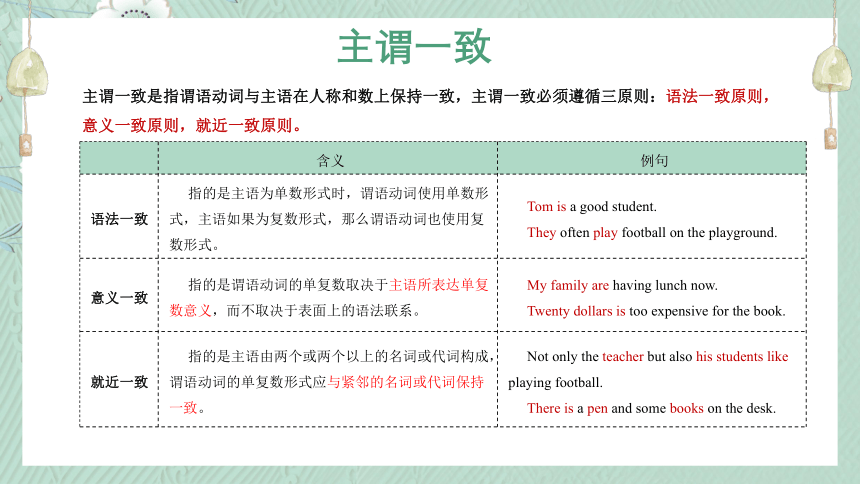
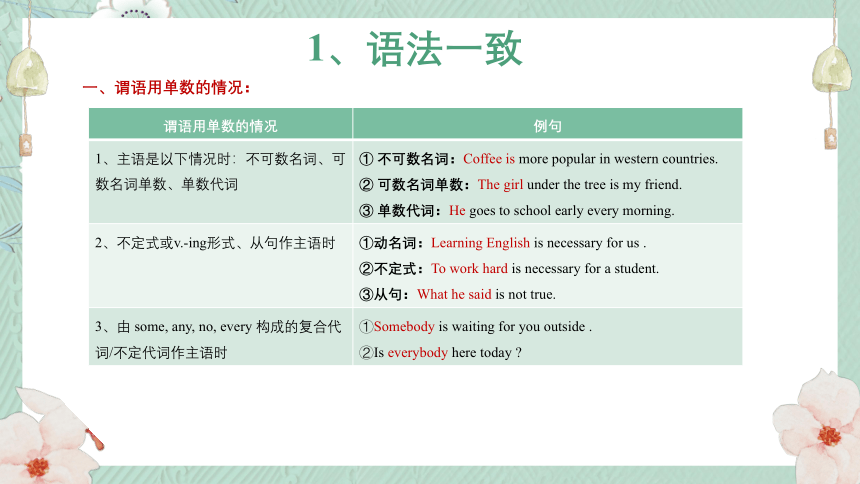
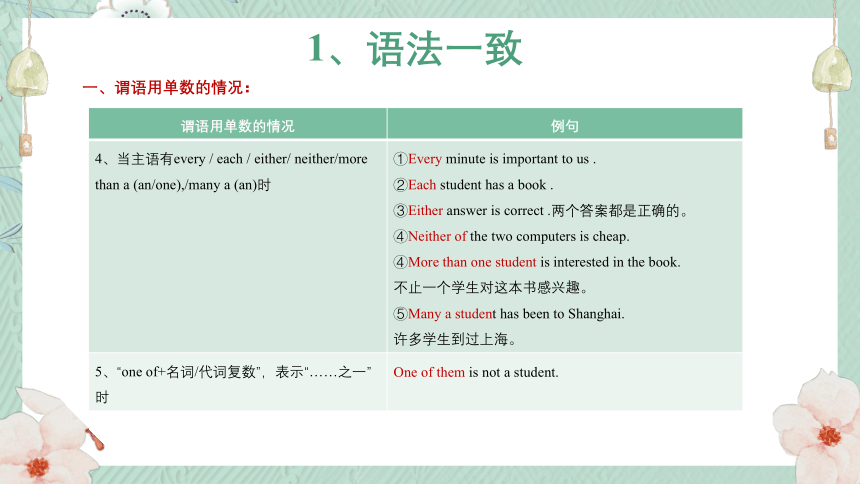
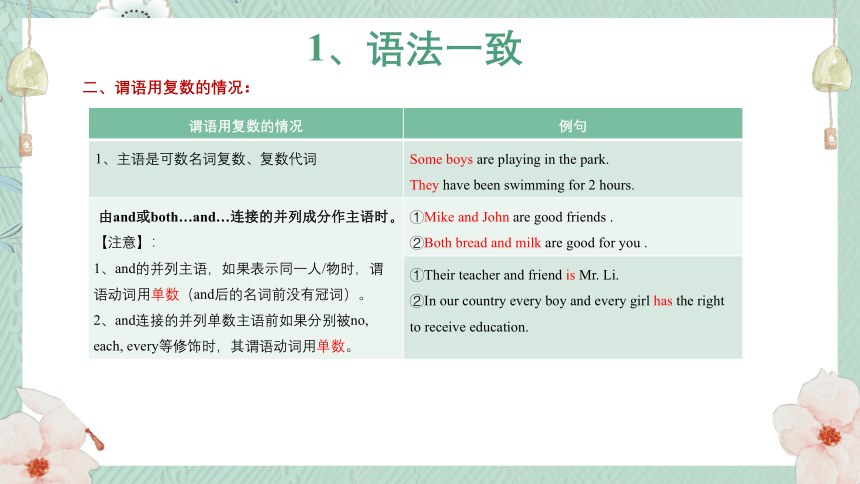
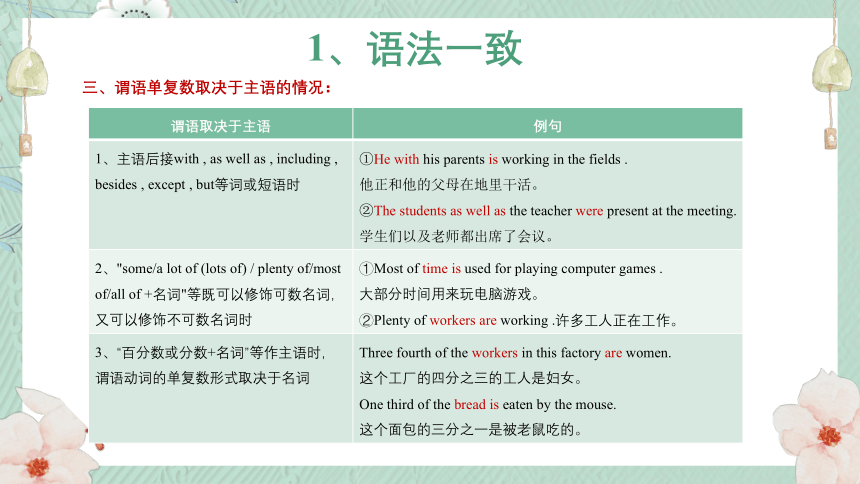
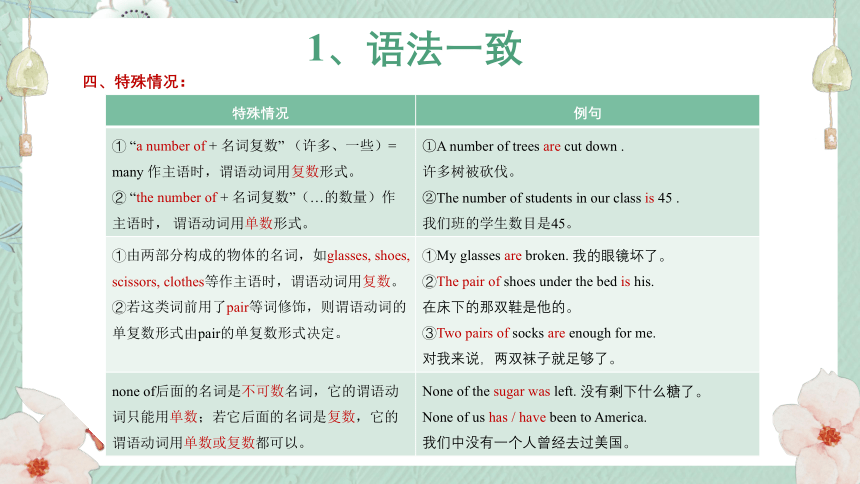
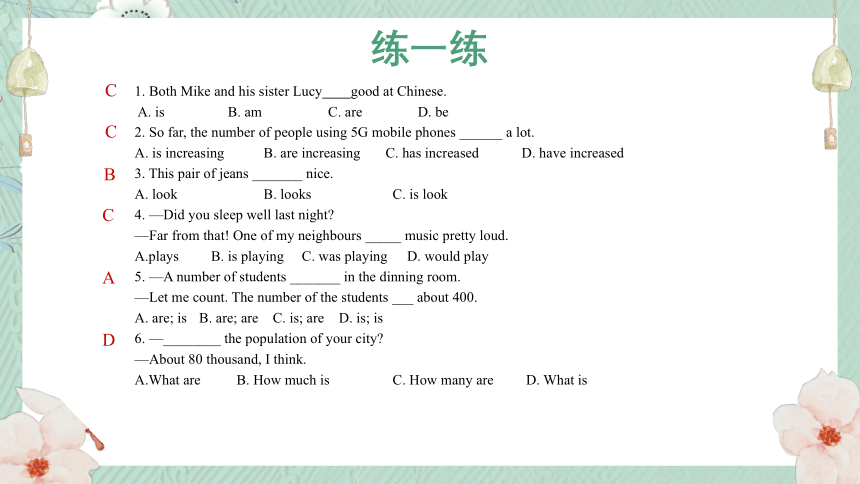
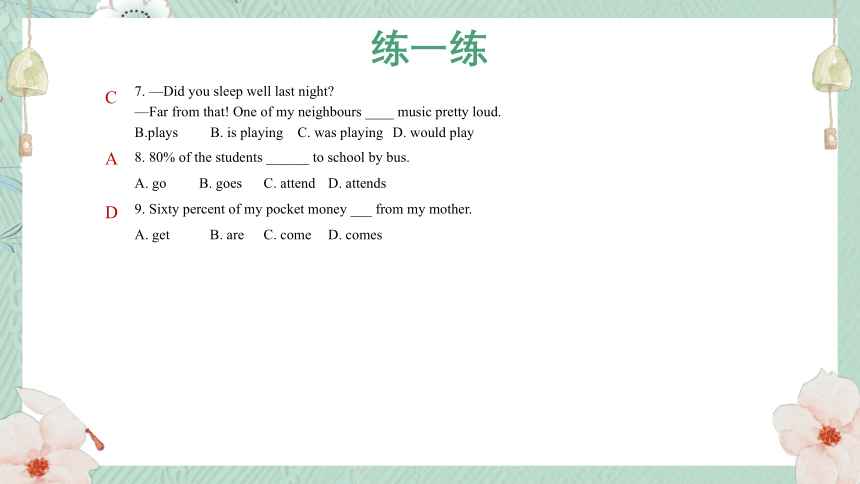
文档简介
(共22张PPT)
《主谓一致》语法专题
主谓一致
主谓一致是指谓语动词与主语在人称和数上保持一致,主谓一致必须遵循三原则:语法一致原则,意义一致原则,就近一致原则。
含义 例句
语法一致 指的是主语为单数形式时,谓语动词使用单数形式,主语如果为复数形式,那么谓语动词也使用复数形式。 Tom is a good student.
They often play football on the playground.
意义一致 指的是谓语动词的单复数取决于主语所表达单复数意义,而不取决于表面上的语法联系。 My family are having lunch now.
Twenty dollars is too expensive for the book.
就近一致 指的是主语由两个或两个以上的名词或代词构成,谓语动词的单复数形式应与紧邻的名词或代词保持一致。 Not only the teacher but also his students like playing football.
There is a pen and some books on the desk.
1、语法一致
一、谓语用单数的情况:
谓语用单数的情况 例句
1、主语是以下情况时:不可数名词、可数名词单数、单数代词 ① 不可数名词:Coffee is more popular in western countries.
② 可数名词单数:The girl under the tree is my friend.
③ 单数代词:He goes to school early every morning.
2、不定式或v.-ing形式、从句作主语时 ①动名词:Learning English is necessary for us .
②不定式:To work hard is necessary for a student.
③从句:What he said is not true.
3、由 some, any, no, every 构成的复合代词/不定代词作主语时 ①Somebody is waiting for you outside .
②Is everybody here today
1、语法一致
谓语用单数的情况 例句
4、当主语有every / each / either/ neither/more than a (an/one),/many a (an)时 ①Every minute is important to us .
②Each student has a book .
③Either answer is correct .两个答案都是正确的。
④Neither of the two computers is cheap.
④More than one student is interested in the book.
不止一个学生对这本书感兴趣。
⑤Many a student has been to Shanghai.
许多学生到过上海。
5、“one of+名词/代词复数”,表示“……之一”时 One of them is not a student.
一、谓语用单数的情况:
1、语法一致
二、谓语用复数的情况:
谓语用复数的情况 例句
1、主语是可数名词复数、复数代词 Some boys are playing in the park.
They have been swimming for 2 hours.
由and或both…and…连接的并列成分作主语时。 【注意】: 1、and的并列主语,如果表示同一人/物时,谓语动词用单数(and后的名词前没有冠词)。 2、and连接的并列单数主语前如果分别被no, each, every等修饰时,其谓语动词用单数。 ①Mike and John are good friends .
②Both bread and milk are good for you .
①Their teacher and friend is Mr. Li.
②In our country every boy and every girl has the right to receive education.
1、语法一致
三、谓语单复数取决于主语的情况:
谓语取决于主语 例句
1、主语后接with , as well as , including , besides , except , but等词或短语时 ①He with his parents is working in the fields .
他正和他的父母在地里干活。
②The students as well as the teacher were present at the meeting. 学生们以及老师都出席了会议。
2、"some/a lot of (lots of) / plenty of/most of/all of +名词"等既可以修饰可数名词,又可以修饰不可数名词时 ①Most of time is used for playing computer games .
大部分时间用来玩电脑游戏。
②Plenty of workers are working .许多工人正在工作。
3、“百分数或分数+名词”等作主语时,谓语动词的单复数形式取决于名词 Three fourth of the workers in this factory are women.
这个工厂的四分之三的工人是妇女。
One third of the bread is eaten by the mouse.
这个面包的三分之一是被老鼠吃的。
1、语法一致
四、特殊情况:
特殊情况 例句
① “a number of + 名词复数” (许多、一些)= many 作主语时,谓语动词用复数形式。 ② “the number of + 名词复数”(…的数量)作主语时, 谓语动词用单数形式。 ①A number of trees are cut down .
许多树被砍伐。
②The number of students in our class is 45 .
我们班的学生数目是45。
①由两部分构成的物体的名词,如glasses, shoes, scissors, clothes等作主语时,谓语动词用复数。②若这类词前用了pair等词修饰,则谓语动词的单复数形式由pair的单复数形式决定。 ①My glasses are broken. 我的眼镜坏了。
②The pair of shoes under the bed is his.
在床下的那双鞋是他的。
③Two pairs of socks are enough for me.
对我来说,两双袜子就足够了。
none of后面的名词是不可数名词,它的谓语动词只能用单数;若它后面的名词是复数,它的谓语动词用单数或复数都可以。 None of the sugar was left. 没有剩下什么糖了。
None of us has / have been to America.
我们中没有一个人曾经去过美国。
练一练
1. Both Mike and his sister Lucy good at Chinese.
A. is B. am C. are D. be
2. So far, the number of people using 5G mobile phones ______ a lot.
A. is increasing B. are increasing C. has increased D. have increased
3. This pair of jeans _______ nice.
A. look B. looks C. is look
4. —Did you sleep well last night
—Far from that! One of my neighbours _____ music pretty loud.
A.plays B. is playing C. was playing D. would play
5. —A number of students _______ in the dinning room.
—Let me count. The number of the students ___ about 400.
A. are; is B. are; are C. is; are D. is; is
6. —________ the population of your city
—About 80 thousand, I think.
A.What are B. How much is C. How many are D. What is
C
C
B
C
A
D
练一练
7. —Did you sleep well last night
—Far from that! One of my neighbours ____ music pretty loud.
B.plays B. is playing C. was playing D. would play
8. 80% of the students ______ to school by bus.
A. go B. goes C. attend D. attends
9. Sixty percent of my pocket money ___ from my mother.
A. get B. are C. come D. comes
C
A
D
2、意义一致
谓语用单数 例句
1、 and连接的两个名词作主语,在意义上指同一人/物时 The famous singer and dancer is coming to Chongqing .那位著名的歌唱家兼舞蹈家要来重庆。
2、表示时间、金钱、距离、重量等的名词复数作主语时,通常被看作一个整体,谓语动词用单数。 ①Ten years has passed quickly .10年很快就过去了。
②Ten dollars is enough .10美元就够了。
3、数词、加(and)/减(minus)/乘(times)/除(divided by)运算中的谓语动词用单数。 ①Ten is a round number. 十是个整数。
②Six times two is twelve .6乘2等于12.
4、形式上是复数但实际意义为单数名词:maths, politics, physics, news等 Maths is very popular in our class.
一、谓语用单数的情况:
2、意义一致
谓语用复数 例句
1、“the +形容词”表示某类人 The poor are very happy, but the rich are sad. 穷人高兴,但是富人悲伤。
2、“the+姓氏复数”表示“一家人或夫妇二人” The Greens are Americans. 格林一家是美国人
3、表示总称意义的集合名词,如people, police, cattle 等作主语时,只当作复数看待,谓语在任何情况下都用复数。 People here are very friendly. 这儿的人很友好。
The police are looking for the lost child. 警察在寻找那个丢失的小孩。
二、谓语用复数的情况:
2、意义一致
谓语取决于主语 例句
1、集体名词(如family / class等)如果表示集体概念,则谓语动词必须用单数形式,如果表示集体中的成员,则谓语动词必须用复数形式。 ①My family is a small one with three people .
我家是一个有着三口人的小家庭。
②My family all like classical music .
我的家人都喜欢古典音乐。
某些单复同形的名词,表示单数意义时,谓语用单数;反之谓语则用复数。这类名词有:sheep, deer, fish, Chinese,Japanese等。 There are many fish in the Jia Ling River.
嘉陵江时有很多鱼。
One day this white sheep was lost.
有一天,这只白色的绵羊丢了。
三、谓语取决于主语的情况:
练一练
1. The young always ___ an important part in such activities.
A. plays B. play C. playing D. to play
2. My family usually_______bread,eggs and milk _______ breakfast.
A. has;for B. have;for
C. has;on D. have;on
3. People at the community centre ____a big family. They are helpful and kind to each other.
A. likes B. are like C. don t like D. looks like
4.-Hurry up, Jason! We're going to the cinema, but the clothes still need .
-Don't worry. I think thirty minutes enough.
A. washing;are B. to wash;are C. to wash;is D. washing;is
5.I plan to travel to America next month, and I think 2000 dollars ______ enough.
A. was B. are C. is D. were
B
B
B
D
C
练一练
6.One thousand kilometers ______ quite a long way to the ancient, but now we can complete the journey in about one hour by air.
A. was B. had C. were D. have
7.How time flies! Several years ______ since we started our middle school life. We will keep the pleasant experiences in our minds.
A. have pass B. has passed C. will pass
A
B
3、就近原则
就近原则 例句
1. 由either …or… /neither… nor…/ not only … but also…/not … but…或or连接两个并列主语时,其谓语动词在数上与最邻近它的主语保持一致。 ①Not only Lily but also Jack has gone to beijing .
不仅莉莉去了北京,杰克也去了北京。
②Either my father or my brother is coming .
我父亲来,要不然就是我弟弟来。
③Neither she nor you have a dictionary.
她没有字典,你也没有。
2. There be或Here be后面接并列的名词时,谓语动词在数上应与最邻近的名词保持一致。 ①There is a pen and two pencils on the desk .
课桌上有一支钢笔和两支铅笔。
②Here are some flowers and a card for you .
这是给你的一些花和一张卡片。
练一练
1. Not only Sam but also his parents____ coming to China soon.
A. is B. are C. were
2.—What would you like to have for your birthday?
—Either noodles or bread ______ OK.I don't mind.
A. am B. is C. are D. be
3. _________ Lucy_______Lily like singing.
A. Either,or B. Neither,nor C. Not only,but also D. Both,and
4.—What's in the picture on the wall
—There ______ a teacher and some students playing soccer on the playground.
A. has B. are C. is D. have
5.In our school library there a number of books and the number of them growing larger and larger.
A. is;are B. has;is C. are;is D. have;are
B
B
D
C
C
练一练
6. —I d like you to tell me something about Shennongjia.
—I m sorry, but neither Jack nor I _________ there.
A. have been B. has been C. have gone D. has gone
7. There _____ a lot of good news in today’s newspaper.
A. was B. are C. is
A
C
训练巩固
练一练
1. There _____ a pencil and some books on the desk.
A. has B. are C. is
2. Nobody except you _____ late for the meeting yesterday afternoon.
A. is B. were C. was
3. As we all know, the Japanese _____ Japanese.
A. speak B. spoke C. speaks
4. Kate as well as most girls _____ wearing beautiful clothes, but her family _____ very poor.
A. like; is B. likes; is C. likes; are
5. – My shoes _____ worn out .Can you buy me a new pair
- Oh, look ! There _____ a pair of new shoes that I bought for you.
A. is; are B. are; is C. is; is
C
C
A
B
B
练一练
6. Doing eye exercises _____ good for our eyes.
A. is B. are C. be
7. Are there any _____ on the farm
A. sheep B. duck C. horse
9. Both John and Mary _____ interesting in skating.
A. is B. are C. were
10. Each of the students _____ a computer in our class.
A. have B. has C. there is
11. All of my money _____ stolen last night.
A. has B. is C. was
A
A
B
B
C
练一练
12. The police _____ for the lost child on the hill now.
A. looks B. is looking C. are looking
13.Three kilometers _____ a long way. You’d better take a taxi.
A. is B. are C. was
14. Every girl and every boy _____ in new clothes today.
A. are B. is C. were
15. The Blacks _____ getting ready for their holiday.
A. is B. are C. be
16. The musician and writer _____ to visit our school.
A. is coming B. are coming C. enjoy
C
A
B
B
A
练一练
17. The headmaster as well as all the teachers _____.
A. have gone to the museum B. are having a meeting C. is planting trees on the hill
18. Two thirds of them _____ Young Pioneers.
A. was B. is C. are
C
C
《主谓一致》语法专题
主谓一致
主谓一致是指谓语动词与主语在人称和数上保持一致,主谓一致必须遵循三原则:语法一致原则,意义一致原则,就近一致原则。
含义 例句
语法一致 指的是主语为单数形式时,谓语动词使用单数形式,主语如果为复数形式,那么谓语动词也使用复数形式。 Tom is a good student.
They often play football on the playground.
意义一致 指的是谓语动词的单复数取决于主语所表达单复数意义,而不取决于表面上的语法联系。 My family are having lunch now.
Twenty dollars is too expensive for the book.
就近一致 指的是主语由两个或两个以上的名词或代词构成,谓语动词的单复数形式应与紧邻的名词或代词保持一致。 Not only the teacher but also his students like playing football.
There is a pen and some books on the desk.
1、语法一致
一、谓语用单数的情况:
谓语用单数的情况 例句
1、主语是以下情况时:不可数名词、可数名词单数、单数代词 ① 不可数名词:Coffee is more popular in western countries.
② 可数名词单数:The girl under the tree is my friend.
③ 单数代词:He goes to school early every morning.
2、不定式或v.-ing形式、从句作主语时 ①动名词:Learning English is necessary for us .
②不定式:To work hard is necessary for a student.
③从句:What he said is not true.
3、由 some, any, no, every 构成的复合代词/不定代词作主语时 ①Somebody is waiting for you outside .
②Is everybody here today
1、语法一致
谓语用单数的情况 例句
4、当主语有every / each / either/ neither/more than a (an/one),/many a (an)时 ①Every minute is important to us .
②Each student has a book .
③Either answer is correct .两个答案都是正确的。
④Neither of the two computers is cheap.
④More than one student is interested in the book.
不止一个学生对这本书感兴趣。
⑤Many a student has been to Shanghai.
许多学生到过上海。
5、“one of+名词/代词复数”,表示“……之一”时 One of them is not a student.
一、谓语用单数的情况:
1、语法一致
二、谓语用复数的情况:
谓语用复数的情况 例句
1、主语是可数名词复数、复数代词 Some boys are playing in the park.
They have been swimming for 2 hours.
由and或both…and…连接的并列成分作主语时。 【注意】: 1、and的并列主语,如果表示同一人/物时,谓语动词用单数(and后的名词前没有冠词)。 2、and连接的并列单数主语前如果分别被no, each, every等修饰时,其谓语动词用单数。 ①Mike and John are good friends .
②Both bread and milk are good for you .
①Their teacher and friend is Mr. Li.
②In our country every boy and every girl has the right to receive education.
1、语法一致
三、谓语单复数取决于主语的情况:
谓语取决于主语 例句
1、主语后接with , as well as , including , besides , except , but等词或短语时 ①He with his parents is working in the fields .
他正和他的父母在地里干活。
②The students as well as the teacher were present at the meeting. 学生们以及老师都出席了会议。
2、"some/a lot of (lots of) / plenty of/most of/all of +名词"等既可以修饰可数名词,又可以修饰不可数名词时 ①Most of time is used for playing computer games .
大部分时间用来玩电脑游戏。
②Plenty of workers are working .许多工人正在工作。
3、“百分数或分数+名词”等作主语时,谓语动词的单复数形式取决于名词 Three fourth of the workers in this factory are women.
这个工厂的四分之三的工人是妇女。
One third of the bread is eaten by the mouse.
这个面包的三分之一是被老鼠吃的。
1、语法一致
四、特殊情况:
特殊情况 例句
① “a number of + 名词复数” (许多、一些)= many 作主语时,谓语动词用复数形式。 ② “the number of + 名词复数”(…的数量)作主语时, 谓语动词用单数形式。 ①A number of trees are cut down .
许多树被砍伐。
②The number of students in our class is 45 .
我们班的学生数目是45。
①由两部分构成的物体的名词,如glasses, shoes, scissors, clothes等作主语时,谓语动词用复数。②若这类词前用了pair等词修饰,则谓语动词的单复数形式由pair的单复数形式决定。 ①My glasses are broken. 我的眼镜坏了。
②The pair of shoes under the bed is his.
在床下的那双鞋是他的。
③Two pairs of socks are enough for me.
对我来说,两双袜子就足够了。
none of后面的名词是不可数名词,它的谓语动词只能用单数;若它后面的名词是复数,它的谓语动词用单数或复数都可以。 None of the sugar was left. 没有剩下什么糖了。
None of us has / have been to America.
我们中没有一个人曾经去过美国。
练一练
1. Both Mike and his sister Lucy good at Chinese.
A. is B. am C. are D. be
2. So far, the number of people using 5G mobile phones ______ a lot.
A. is increasing B. are increasing C. has increased D. have increased
3. This pair of jeans _______ nice.
A. look B. looks C. is look
4. —Did you sleep well last night
—Far from that! One of my neighbours _____ music pretty loud.
A.plays B. is playing C. was playing D. would play
5. —A number of students _______ in the dinning room.
—Let me count. The number of the students ___ about 400.
A. are; is B. are; are C. is; are D. is; is
6. —________ the population of your city
—About 80 thousand, I think.
A.What are B. How much is C. How many are D. What is
C
C
B
C
A
D
练一练
7. —Did you sleep well last night
—Far from that! One of my neighbours ____ music pretty loud.
B.plays B. is playing C. was playing D. would play
8. 80% of the students ______ to school by bus.
A. go B. goes C. attend D. attends
9. Sixty percent of my pocket money ___ from my mother.
A. get B. are C. come D. comes
C
A
D
2、意义一致
谓语用单数 例句
1、 and连接的两个名词作主语,在意义上指同一人/物时 The famous singer and dancer is coming to Chongqing .那位著名的歌唱家兼舞蹈家要来重庆。
2、表示时间、金钱、距离、重量等的名词复数作主语时,通常被看作一个整体,谓语动词用单数。 ①Ten years has passed quickly .10年很快就过去了。
②Ten dollars is enough .10美元就够了。
3、数词、加(and)/减(minus)/乘(times)/除(divided by)运算中的谓语动词用单数。 ①Ten is a round number. 十是个整数。
②Six times two is twelve .6乘2等于12.
4、形式上是复数但实际意义为单数名词:maths, politics, physics, news等 Maths is very popular in our class.
一、谓语用单数的情况:
2、意义一致
谓语用复数 例句
1、“the +形容词”表示某类人 The poor are very happy, but the rich are sad. 穷人高兴,但是富人悲伤。
2、“the+姓氏复数”表示“一家人或夫妇二人” The Greens are Americans. 格林一家是美国人
3、表示总称意义的集合名词,如people, police, cattle 等作主语时,只当作复数看待,谓语在任何情况下都用复数。 People here are very friendly. 这儿的人很友好。
The police are looking for the lost child. 警察在寻找那个丢失的小孩。
二、谓语用复数的情况:
2、意义一致
谓语取决于主语 例句
1、集体名词(如family / class等)如果表示集体概念,则谓语动词必须用单数形式,如果表示集体中的成员,则谓语动词必须用复数形式。 ①My family is a small one with three people .
我家是一个有着三口人的小家庭。
②My family all like classical music .
我的家人都喜欢古典音乐。
某些单复同形的名词,表示单数意义时,谓语用单数;反之谓语则用复数。这类名词有:sheep, deer, fish, Chinese,Japanese等。 There are many fish in the Jia Ling River.
嘉陵江时有很多鱼。
One day this white sheep was lost.
有一天,这只白色的绵羊丢了。
三、谓语取决于主语的情况:
练一练
1. The young always ___ an important part in such activities.
A. plays B. play C. playing D. to play
2. My family usually_______bread,eggs and milk _______ breakfast.
A. has;for B. have;for
C. has;on D. have;on
3. People at the community centre ____a big family. They are helpful and kind to each other.
A. likes B. are like C. don t like D. looks like
4.-Hurry up, Jason! We're going to the cinema, but the clothes still need .
-Don't worry. I think thirty minutes enough.
A. washing;are B. to wash;are C. to wash;is D. washing;is
5.I plan to travel to America next month, and I think 2000 dollars ______ enough.
A. was B. are C. is D. were
B
B
B
D
C
练一练
6.One thousand kilometers ______ quite a long way to the ancient, but now we can complete the journey in about one hour by air.
A. was B. had C. were D. have
7.How time flies! Several years ______ since we started our middle school life. We will keep the pleasant experiences in our minds.
A. have pass B. has passed C. will pass
A
B
3、就近原则
就近原则 例句
1. 由either …or… /neither… nor…/ not only … but also…/not … but…或or连接两个并列主语时,其谓语动词在数上与最邻近它的主语保持一致。 ①Not only Lily but also Jack has gone to beijing .
不仅莉莉去了北京,杰克也去了北京。
②Either my father or my brother is coming .
我父亲来,要不然就是我弟弟来。
③Neither she nor you have a dictionary.
她没有字典,你也没有。
2. There be或Here be后面接并列的名词时,谓语动词在数上应与最邻近的名词保持一致。 ①There is a pen and two pencils on the desk .
课桌上有一支钢笔和两支铅笔。
②Here are some flowers and a card for you .
这是给你的一些花和一张卡片。
练一练
1. Not only Sam but also his parents____ coming to China soon.
A. is B. are C. were
2.—What would you like to have for your birthday?
—Either noodles or bread ______ OK.I don't mind.
A. am B. is C. are D. be
3. _________ Lucy_______Lily like singing.
A. Either,or B. Neither,nor C. Not only,but also D. Both,and
4.—What's in the picture on the wall
—There ______ a teacher and some students playing soccer on the playground.
A. has B. are C. is D. have
5.In our school library there a number of books and the number of them growing larger and larger.
A. is;are B. has;is C. are;is D. have;are
B
B
D
C
C
练一练
6. —I d like you to tell me something about Shennongjia.
—I m sorry, but neither Jack nor I _________ there.
A. have been B. has been C. have gone D. has gone
7. There _____ a lot of good news in today’s newspaper.
A. was B. are C. is
A
C
训练巩固
练一练
1. There _____ a pencil and some books on the desk.
A. has B. are C. is
2. Nobody except you _____ late for the meeting yesterday afternoon.
A. is B. were C. was
3. As we all know, the Japanese _____ Japanese.
A. speak B. spoke C. speaks
4. Kate as well as most girls _____ wearing beautiful clothes, but her family _____ very poor.
A. like; is B. likes; is C. likes; are
5. – My shoes _____ worn out .Can you buy me a new pair
- Oh, look ! There _____ a pair of new shoes that I bought for you.
A. is; are B. are; is C. is; is
C
C
A
B
B
练一练
6. Doing eye exercises _____ good for our eyes.
A. is B. are C. be
7. Are there any _____ on the farm
A. sheep B. duck C. horse
9. Both John and Mary _____ interesting in skating.
A. is B. are C. were
10. Each of the students _____ a computer in our class.
A. have B. has C. there is
11. All of my money _____ stolen last night.
A. has B. is C. was
A
A
B
B
C
练一练
12. The police _____ for the lost child on the hill now.
A. looks B. is looking C. are looking
13.Three kilometers _____ a long way. You’d better take a taxi.
A. is B. are C. was
14. Every girl and every boy _____ in new clothes today.
A. are B. is C. were
15. The Blacks _____ getting ready for their holiday.
A. is B. are C. be
16. The musician and writer _____ to visit our school.
A. is coming B. are coming C. enjoy
C
A
B
B
A
练一练
17. The headmaster as well as all the teachers _____.
A. have gone to the museum B. are having a meeting C. is planting trees on the hill
18. Two thirds of them _____ Young Pioneers.
A. was B. is C. are
C
C
同课章节目录
- 词法
- 名词
- 动词和动词短语
- 动词语态
- 动词时态
- 助动词和情态动词
- 非谓语动词
- 冠词
- 代词
- 数词和量词
- 形容词副词及其比较等级
- 介词和介词短语
- 连词和感叹词
- 构词法
- 相似、相近词比较
- 句法
- 陈述句
- 一般疑问句和否定疑问句
- 特殊疑问句及选择疑问句
- 反意疑问句
- 存在句(There be句型)
- 宾语从句
- 定语从句
- 状语从句
- 主谓一致问题
- 简单句
- 并列句
- 复合句
- 主谓一致
- 主、表语从句
- 名词性从句
- 直接引语和间接引语
- 虚拟语气
- 感叹句
- 强调句
- 倒装句
- 祈使句
- 句子的成分
- 句子的分类
- 题型专区
- 单项选择部分
- 易错题
- 完形填空
- 阅读理解
- 词汇练习
- 听说训练
- 句型转换
- 补全对话
- 短文改错
- 翻译
- 书面表达
- 任务型阅读
- 语法填空
- 其他资料
